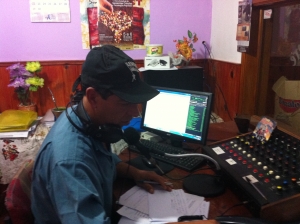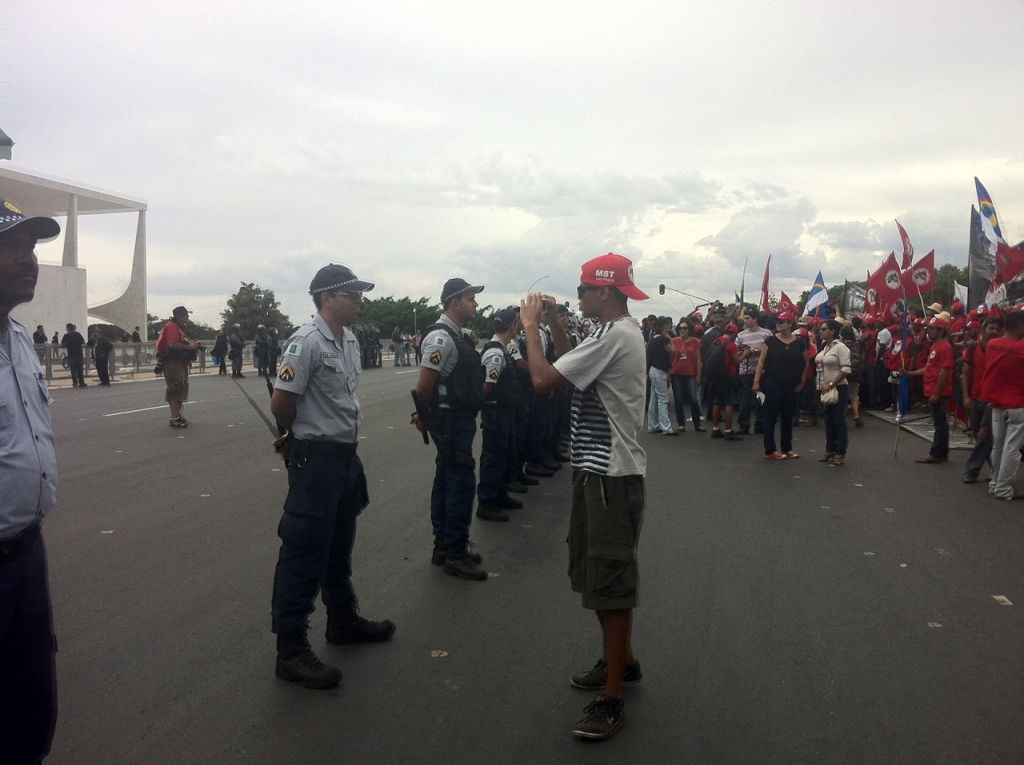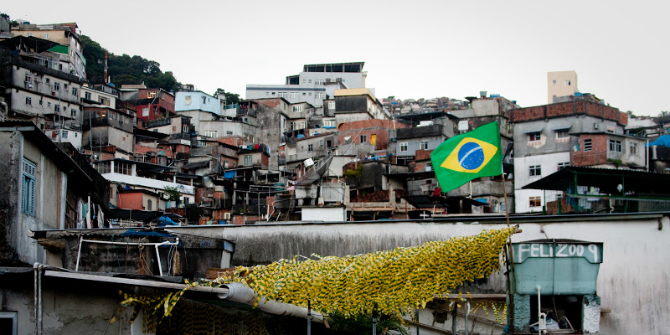The potential use of digital media for the benefit of social movements and traditionally marginalised groups seems to be endless. In this post, Paola Sartoretto discusses the use of technology in the context of the Brazilian Landless Workers Movement (MST), showing that, in being selective and reflective of the utilisation of new media, the MST incorporates the features of these media that work for their objectives. However, given that the most pressing work for insurgent groups is in the streets, the exact relevance of new media for these collectives is yet to be defined.
Recently we have witnessed an increasing discussion about the inclusive and democratic features of digital media, coming from different academic fields as well as from policy makers. Digital media not only make content production cheaper and facilitate availability; they also enable communication with wide audiences beyond geographic boundaries. The most distinctive feature of digital communications is the potential to create so-called virtual networks that can be activated in order to coordinate actions and circulate content and information. Such potential could be (and has been) used by a variety of traditionally marginal and insurgent groups in order to create awareness of the problems they face, mobilise action, change public debate agendas and, ultimately operate the changes they advocate.
The idea that media can be used in alternative ways, for insurgency and mobilisation, is not new. Raymond Williams, in his classic text Television, pointed out that video could be used for the production of alternatives to the mass broadcasting of the time. However, when it comes to digital technologies, stakes are higher, there are conflicting interests and agendas may not be clear at first sight[i]. Moreover, when we look closer into the practices of others than western middle classes living in urban centres, we realise that the social relations between people involving technologies are more complex.
Seeking to understand the ways in which marginal groups use different media in order to mobilise, articulate demands and gain space in the public discourse, I followed closely the activities of the Brazilian Landless Workers Movement (MST). The MST was founded in 1984, as a movement uniting many rural workers organisations throughout Brazil to promote land redistribution through agrarian reform and to demand public policies that granted rights to rural workers and their families.
 During its 30 years of existence, the MST has faced hostility from many sectors of society in Brazil – landowners, agribusiness companies and not least the media. At the same time, they realised from the start the importance of establishing arenas for communication. The movement’s national newspaper Jornal Sem-Terra was created even before the MST existed officially. The implementation of primitive radio systems was crucial for the organisation of campsites and cooperation with local radios, usually operated by the church or trade unions, facilitated the dialogue with local communities in the towns where MST occupied land.
During its 30 years of existence, the MST has faced hostility from many sectors of society in Brazil – landowners, agribusiness companies and not least the media. At the same time, they realised from the start the importance of establishing arenas for communication. The movement’s national newspaper Jornal Sem-Terra was created even before the MST existed officially. The implementation of primitive radio systems was crucial for the organisation of campsites and cooperation with local radios, usually operated by the church or trade unions, facilitated the dialogue with local communities in the towns where MST occupied land.
In this context, the advent of digital media has brought with it new challenges and possibilities for the MST as a social actor. Considering current discussions about new media and social activism, two aspects about the incorporation of new media into the routines of the organisation are worth a closer analysis. First, MST appropriates new media through a reflexive process. This means that the organisation is not usually the first and faster in using the latest platforms, if compared with other groups in Brazil, such as collective Mídia Ninja, who has been using social media to broadcast live and unedited protests, demonstrations and other events of public interest.
Press-officer Ígor Felippe Santos, working at the MST’s press office in São Paulo, points out that the organisation has “a very sober view in relation to the internet and social networks as instruments of the movement and not as something that will strengthen internal organisation”.
Mayrá Lima, MST press-officer in Brasília also observes that the movement must make the most of the potentialities of social networks but without forgetting that “our struggle continues on the streets”. She stresses that it is not possible to mobilise society through social media, only through direct action, because according to her “no one is going to start a revolution from their red keyboard”. These views denote the reflexive knowledge constructed among militants about their organisation and about the potentialities of different media. They also contradict the idea that digital media alone would bring diversity to the public debate by including marginal groups such as MST (see for instance Negroponte 1996; Castells, 2001, 2009).
Second, the increasing adoption of new media platforms (YouTube, Twitter and Facebook) by the movement is not backed by an optimistic belief that through these platforms it is possible to change the course of public debate and political agendas. “What we need in Brazil is a set of policies for communication that are truly public, in which social movements and all social groups can have spaces to communicate”, observes Solange Engelman, member of the MST’s national leadership representing the communication sector. Her view resonates with the perspective presented by media researcher Carolina Matos, who argued that there are sectors of society in Brazil who are excluded from the public debate that takes place in mainstream media. Social movements in Brazil, MST included, are aware of the exclusive character of mainstream media, aggravated by the concentration of ownership.
Nevertheless, their strategy to fight this inequality is not to so much to create their own alternative media – with the help of technology – but to act at the structural level through initiatives such as the National Forum for Democratisation of Communication (FNDC). FNDC is a pressure group formed by a poll of civil society organisations in order to advance a series of demands for the communications sector in Brazil. Mayrá Lima explains that the MST decided to participate in the Forum
because we consider that democratisation of communication is a fundamental cause to change the relation of forces in society, including the promotion of the agrarian reform, because as long as media are in the hands of a few companies, our agendas, the social movements, and the workers will have serious difficulties in making a dispute of ideas.
These two aspects of the MST’s relations with media, which emerged from their long experience as an oppositional social movement in Brazil, can serve to start discussions about the potentialities of new media for social actors at the margins of the public debate. They also redirect the focus to political economic aspects of media in developing countries and emerging democracies, which in my view can be a much stronger vector of change than technology on its own.
References
Castells, M. (2001). The rise of the network society: The information age: Economy, society, and culture. Vol. 1.Oxford University Press.
Castells, M. (2009). Communication Power. Oxford University Press.
Matos, C. (2012). Media and politics in Latin America: globalization, democracy and identity. IB Tauris.
Negroponte, N. (1996). Being digital. Random House LLC.
Williams, R. (2003). Television: Technology and cultural form. Psychology Press.
[i] For in-depth socio-political-economic accounts of the relations between internet, democracy, insurgency and pluralism see Evgeny Morozov’s The Net Delusion, published in 2011, and Robert McChesney’s Digital Disconnect: How Capitalism is turning internet against democracy, published in 2013. For a critique of cyber-utopianism see Jodi Dean’s Democracy and other neoliberal fantasies: communicative capitalism and left politics, published in 2009.
All photographs courtesy of Paola Sartoretto.
About the Author
Paola Sartoretto is currently undertaking a PhD in Media and Communication at Karlstad University, Sweden. Her project investigates the potentials and challenges experienced by counter-hegemonic social movements when using and relating to media. Paola comes originally from Brazil where she obtained her degree in Journalism and worked as a free-lance journalist and communications assistant in the areas of culture promotion and corporate social responsibility.
The views expressed on this post belong solely to the author and should not be taken as the opinion of the Favelas@LSE Blog nor of the LSE.
Please read our comments policy before commenting.





